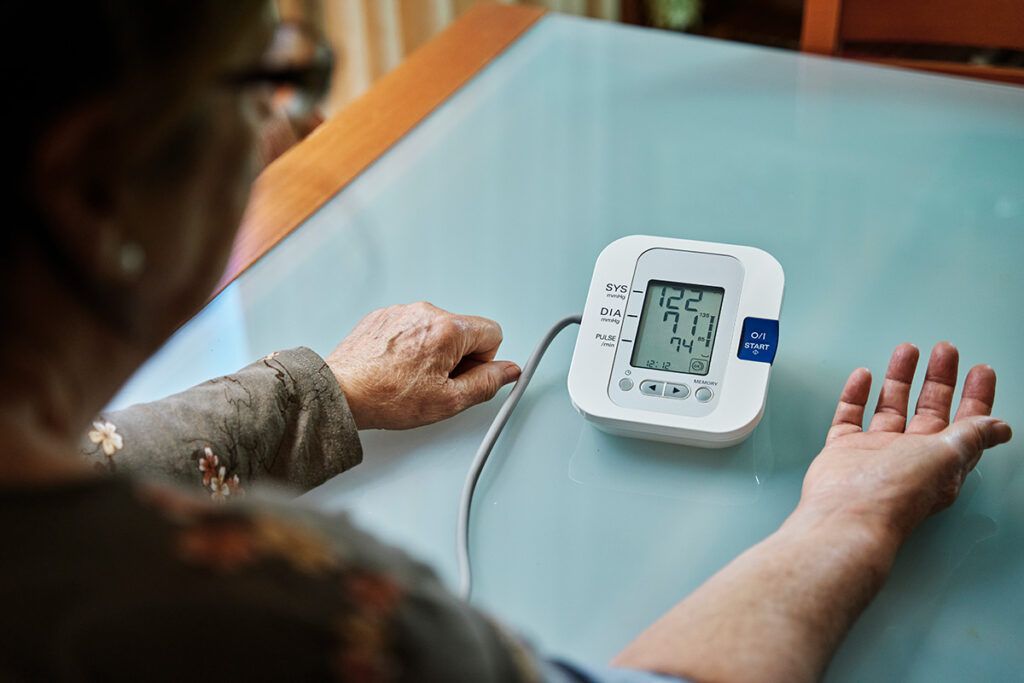Blood pressure is the force or pressure your blood exerts against the walls of your arteries when your heart beats. When you get a blood pressure reading, you see two numbers:
- Systolic blood pressure (top number): This is the pressure against your arteries when your heart contracts and pumps blood.
- Diastolic blood pressure (bottom number): This is the pressure against your arteries when your heart relaxes.
Pulse pressure is a measurement that indicates the difference in blood pressure when your heart contracts versus when it relaxes.
This article discusses the causes, effects, and symptoms of wide pulse pressure.
What is wide pulse pressure?

Wide pulse pressure refers to a difference that is wider or greater than 60 millimeters of mercury (mm Hg) between your systolic and diastolic blood pressure.
You can get this number by subtracting the bottom number from the top number in a blood pressure reading. For example, if your blood pressure reading is 120/80 mm Hg, your pulse pressure is 40 mm Hg (120 – 80 = 40).
The standard pulse pressure is around 40 mm Hg, although it may vary depending on your age and overall health. Your “usual” may also be different from someone else’s.
You may also get a one-off pulse pressure reading that is lower or higher than 40 mm Hg. If you repeatedly get numbers that are significantly higher or lower than 40 mm Hg, it is highly advisable to talk with a healthcare professional.
What causes repeated wide pulse pressure?
Repeated wide pulse pressure may result from different factors, including chronic health conditions (conditions persisting for a long time or recurring) like the following:
- Aortic regurgitation: In this condition, the blood flows backward through a valve in your heart. Your heart needs to work harder to ensure that enough blood pumps through your body.
- Aortic sclerosis: This condition leads to calcification, thickening, and narrowing of a valve in the heart. The narrowing of this valve makes it difficult for the heart to pump blood.
- Severe iron deficiency anemia: If you have this condition, your body doesn’t have enough iron to produce red blood cells. Since the number of red blood cells is low, the body becomes deficient in oxygen-rich blood.
- Atherosclerosis: This condition develops from the buildup of cholesterol and other fatty substances inside your arteries.
- Hyperthyroidism: This condition refers to an overactive thyroid gland that produces more thyroid hormones than your body needs. These hormones have important roles in the functioning of your body. This includes how your heart works.
If you don’t live with these underlying causes of wide pulse pressure, the reading may suggest that your cardiovascular or kidney health may need medical attention. But pulse pressure alone is not a sign of these or any other conditions.
Also, a wide pulse pressure from a blood pressure reading of 120/60 may not signal the same health challenges as a reading of 150/90.
Your healthcare professional will likely explore other symptoms, your family history and your medical history before determining what a wide pulse pressure reading may mean.
Is wide pulse pressure a medical emergency?
In most cases, a one-off wide pulse pressure reading is not a medical emergency.
If you constantly get a wide difference between your systolic and diastolic readings, you may want to consider speaking with a medical professional.
If you experience any of these symptoms, it is highly advisable that you get immediate medical assistance:
- chest pain
- shortness of breath
- loss of consciousness
- mental confusion
- difficulty speaking
- changes in vision
Effects of wide pulse pressure
If you consistently have wide pulse pressure, and this is due to an underlying health challenge, your body may experience the following:
- Increased chance of heart disease: A wide pulse pressure may indicate a strain on your blood vessels and heart, suggesting that you could be more likely to develop heart disease.
- Organ damage: A wide pulse pressure may be a signal of low oxygen supply and blood flow to some of your organs, like the kidneys and brain, which could lead to longer-term effects on the organs.
- Dizziness, fainting, and heart palpitations: Wide pulse pressure may make you more likely to develop a condition called atrial fibrillation. Atrial fibrillation can cause heart palpitations, tiredness, fainting, chest pains, and breathlessness.
The effects of wide pulse pressure may depend on its underlying causes and other contributing factors. Consulting a health professional can provide an accurate diagnosis and management plan.
Symptoms of wide pulse pressure
Wide pulse pressure doesn’t cause any symptoms by itself.
Atherosclerosis, one of the possible contributing factors to wide pulse pressure, does not cause any early symptoms either. Consulting a doctor will help you to evaluate the symptoms before determining if they are associated with wide pulse pressure or an underlying condition.
If you need help covering the cost of medications, the free Optum Perks Discount Card could help you save up to 80% on prescription drugs. Follow the links on drug names for savings on that medication, or search for a specific drug here.
